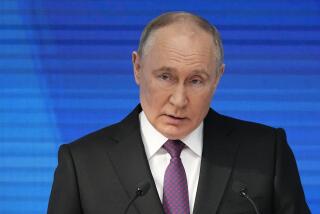Gorbachev Issues Stern Warning to Critics of His Leadership, Policies : Kremlin: Soviet leader tells conservatives, radicals that straying from his course would be disastrous.
- Share via
MOSCOW — Soviet President Mikhail S. Gorbachev, facing strong challenges to his leadership from both conservatives within the Communist Party and from radicals who are beginning to break away, warned Saturday that anything but a middle course would lead the country toward disaster.
Anticipating a sharp debate at an urgent meeting of the party’s policy-making Central Committee as early as today, Gorbachev declared his determination to pursue fundamental but step-by-step reforms of the Soviet political and economic system. At the same time, he pledged to adhere to socialism and to preserve the country’s unity.
The Central Committee will be discussing the most explosive issue the country now faces--growing nationalism in many of the Soviet Union’s 15 constituent republics--following the decision last week of the Lithuanian Communist Party to declare its independence from the parent Soviet party.
Speaking to the Congress of People’s Deputies, the Soviet Parliament, Gorbachev voiced his most somber warning yet to the Lithuanians and other radical nationalists. He said that “in these days, to exercise self-determination through secession is to blow up the union, to pit peoples against one another and to sow discord, bloodshed and death.”
But Gorbachev’s reform policies and his leadership of the party are expected to be debated as well, according to Soviet political observers, and this holds considerable peril for him. Conservatives are likely to blame him for the threat, which emerged even before the Lithuanian action, to the party as well as to national unity. And radicals will probably renew their call for bolder moves away from the past as the antidote to the growing political restiveness here.
“There are attempts to make you believe that I am working on behalf of someone, that I want to dissolve the party, the state and the (Soviet) federation,” Gorbachev told the Congress on Saturday.
“One should not say, as some people do, that Gorbachev is sitting between two chairs. I say I am sitting in my own chair--the one that you put me in. . . . I am a Communist, and I remain proud of it.”
With the prospect of the once-monolithic Communist Party fragmenting into regional parties and political factions, Gorbachev’s critics now have a far more potent and emotional issue, again in the forum of the Central Committee.
“My stand is unambiguous: We need to treat this ailing society,” Gorbachev told the deputies. “Serious, radical measures are essential. . . . Only through this will we be able to provide the oxygen that will give a second wind to our country, society and people. At present, perestroika (Gorbachev’s reform program) is the salvation of socialism.”
The deputies were concluding a heated, two-day debate on a constitutional amendment establishing a governmental commission that will oversee observance of the country’s constitution and the transition to a political system based on law. The proposal was approved, 1,639 to 137, but only after a compromise that reduced the commission’s authority in conflicts between the central government and constituent republics.
Gorbachev said that if the Soviet Union were to deal with the mounting nationalist pressures--including growing secessionist tendencies--it must act quickly to decentralize into a truly federal union.
“I am deeply convinced that we shall be able to add substance to the federation and thereby achieve political and economic sovereignty and give scope for the development of culture, languages and so on, remaining within the union and cooperating with one another,” he said.
“But this will be a different kind of union and different relations,” he continued. “That is why, brushing aside all the provocative calls, I hold that it is essential for us to add substance to the federation. If we mark time and introduce nothing, the process will take on acute forms. We can keep our union intact by making headway and adding substance to our federation.”
While warning conservatives that he will not retreat on this issue, Gorbachev also told radicals that he will not be pushed into moving so fast that the country disintegrates into chaos.
Soviet society has to be made “more just, more humane, more democratic,” Gorbachev continued, and this cannot be done “either on the past Stalinist values or the ‘back-to-capitalism’ idea propagated by some.”
“At this stage of revolutionary changes where we find ourselves now, every time we make a new step we make a choice,” he said. “It is necessary to make those choices but remain committed to our goals. We proceed along the road of the (Bolshevik) October Revolution, and we are adding substance to our socialist system and society.”
He lashed out at the 400-member, radical Inter-Regional Group of Deputies, saying they sought a political coup that would bring them to power and lead to the implementation of their proposals for much faster and more dramatic changes here.
And, to the applause of the deputies, Gorbachev defended the Russian people, saying they were not responsible for all the problems the Soviet Union faces today.
As a nation, the Russians had “a huge store of internationalism, benevolence and humanism,” he said, replying to the implicit but frequent attacks on Russians by other nationalities.
“The blame for what has happened with the Russian people and what has affected all the nations of the country is not on the Russian people,” he declared.
More to Read
Sign up for Essential California
The most important California stories and recommendations in your inbox every morning.
You may occasionally receive promotional content from the Los Angeles Times.













